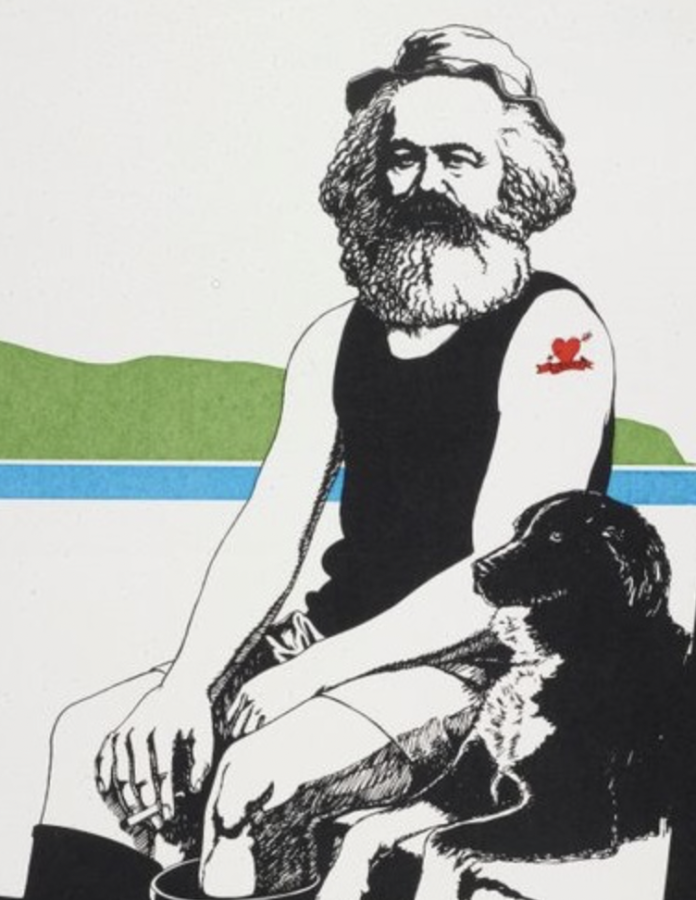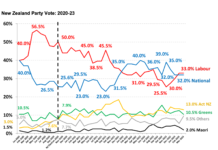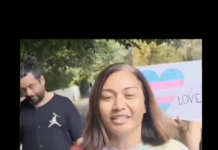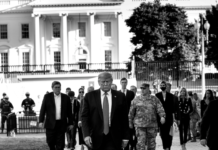The New Zealand government has firmly come in behind the United States position of supporting Ukraine in the war arising out of Russia’s unjustified invasion. At one level this appears the right position to take. But when one drills deeper a more nuanced position should be considered.
When one goes beyond Europe, North America, and former British colonies like Australia and New Zealand, many more countries (including in Africa, Central and South America, and Asia) have a more nuanced position; that is; neither supporting Russia’s or the United States’ positions.
Eleven months ago
On 10 March 2022 I published my first and, until now, only blog on the war in Ukraine. At that time I placed the war not simply in the context of the invasion of one country by another (Russia).
I also placed it in a wider context of longstanding and escalating tension between the United States, largely working through the North Atlantic Treaty Organisation (NATO), and Russia.
When a bigger country militarily attacks a smaller country it is intuitive to support the latter. But what if the bigger country is only a medium-sized capitalist economy and the smaller country is supported by a much bigger capitalist superpower and also leads a military alliance which includes several other medium to large capitalist economies? Is the smaller country much more than a proxy?
I described the war as a case of the continuation of politics by another means and argued that it could only be resolved through a self-determination based strategic approach. Self-determination required to resolve a war which continues politics by other means.
Starting point
I still adhere to what I wrote 11 months ago but with two main qualifications. First, I underestimated the far right, including fascist, influence in Ukraine.
Second, and more important for this blog, the way the war has escalated and protracted, a self-determination approach is utopian in the short to medium term at least (but it remains central for a sustainable long-term solution).
There is no justification for a war that creates such a humanitarian crisis as this one has. This is not alleviated by the fact that Ukrainian troops have been responsible for innocent deaths in Luhansk and Donetsk in the east. Here the war resembles more of a civil war.
There needs to be a starting point for considering the war in Ukraine. For me it is that the Russian invasion is morally unjustified. It is inhuman, barbaric, oppresses the innocent, and responsible for the avoidable deaths of thousands.
The threat to Ukrainians is intensified by the invader also being a nuclear power. Whatever the eventual outcome, the lives of millions of Ukrainians will be devastated to varying degrees for many years.
Beyond the starting point
When one country invades another (regardless of its backers) it is inevitably the invader rather than the invaded who is primarily, but not exclusively, responsible for the loss and devastation of innocent lives. This statement ranks high among self-evident truths. But the starting point is not the only point to consider.

Journalist Serge Halimi, diplomatic solution needed
I found a paywalled article by French journalist Serge Halimi published in Le Monde Diplomatique (November 2022) particularly helpful in working through this consideration: diplomatic solution is needed to end the war .
The war can’t be explained by a claim of ‘Russian expansionism’. Since the collapse of the Soviet Union, Russia had not sought to takeover Ukraine; it was more concerned with the relationships between the two neighbours. This is in the context of gradual expansion of United States’ influence in the name of NATO towards Russia’s borders.
There is an argument that Russia was provoked by this expansion but in no way is this a justification for invasion. In fact, to the extent that it was used as a justification, it has proved to be a disastrous own goal with the previously neutral Finland and Sweden now seeking NATO membership along with Ukraine itself. Russia’s invasion has had the perverse outcome of strengthening NATO.
Saving Ukraine from fascism!!
Just as the invasion of Ukraine can’t be explained by Russian expansionism, neither can it be explained by President Vladimir Putin’s claim of saving Ukraine from fascism.

President Putin uses false claims to justify invasion
This does not mean that ultra-nationalism is prevalent in Ukrainian politics. It is, particularly in the western part of the country. With the strong support of fascist forces it was a powerful influence in the overthrow of Ukraine’s elected president, President Viktor Yanukovych, in 2014.
The previous year Yanukovych had ended trade integration talks with the European Union in which the latter had been pressing for stringent neo-liberal measures to be adopted. Instead he resumed economic negotiations with Russia.
The United States then became engaged hands-on in a destabilisation campaign against the Yanukovych government which led to the successful coup the following February.
Yanukovych was a corrupt leader but so were those who preceded and succeeded him. Political corruption has been the norm for Ukrainian ‘democracy’ for decades. His election was democratic by these Ukrainian standards.
More important was the large polarisation in Ukraine which was highlighted by Yanukovych’s election. His support was centred in the regions, especially in the east, (his party was called the ‘Party of Regions’) where Ukrainians generally favoured close relations with Russia. Support for the coup was centred in the urban centres, particularly in the west, where Ukrainians generally favoured closer EU relations.
Ukraine was anything but a liberal democracy where, following the coup, ultra-nationalist forces have had a prevailing influence, including over President Volodymyr Zelenskyy elected in 2019. Although fascists were electorally insignificant, they were influential in the 2014 coup and are powerful in the wider politic (especially in the military and militias) operating within the smelly armpit of ultra-nationalism.
Media coverage has focussed on the suppression of dissent, including imprisonment in Russia of Russians who express their disagreement with the invasion. But there is little coverage on the suppression of left-wing Ukrainians who express their disagreement with aspects of the Zelenskiy government’s attitude to both Russia before the invasion and the response to it.
Dissent is suppressed in both countries. In fact, prior to the invasion, under its ultranationalist influence the Zelenskyy government was responsible for repressing the use of the Russian language by Ukrainians.
As mentioned above, in my earlier post on Ukraine, I underestimated the influence of fascists. However, Putin’s claim that Russia’s ‘special military operation’ was driven by the need to defeat fascism in Ukraine is a fabrication.
Ultra-nationalism is also influential in Russia and within it a fascist movement. The difference between its influence in the two countries is one of degree rather than kind. Recent commentary suggests that if Putin was to be overthrown in a coup, it likely would be led by ultra-nationalists more hard-line over the war than him (as difficult as this is to believe), possibly even pro-fascists.
War crimes hypocrisy
Hypocrisy over this war is evident in many forms. One is the charge led by US President Joe Biden that Putin should be tried as a war criminal. The hypocrisy of this is well dealt with by investigative journalist Jeremy Scahill in The Intercept (11 February): US hypocrisy on war crimes.
Suffice to say, the double-standard of Biden wanting to pursue war crimes against Putin but not against George W. Bush for his war crimes in Iraq stands out before even considering Scahill’s article.

American journalist Jeremy Scahill exposes US hypocrisy over Putin war crimes charge
Scahill pointedly notes that the logical venue to prosecute Putin’s alleged crime would be the International Criminal Court. But the United States, Russia and Ukraine stand outside the ICC which has overwhelmingly focussed on African nations and has never indicted a leader of a major world power.

President Joe Biden’s war crimes claims hypocritical
The ICC does not have jurisdiction over war crimes in Ukraine largely due to the United States’ opposition to amend its rules to prohibit prosecuting personnel from countries that do not formally recognise the Court.
Learning from the Cuban (Turkish) missile crisis
In his article Serge Halimi raises an interesting historical reference to the Cuban missile crisis of October 1962 (equally so it could have been called the Turkish missile crisis) which involved an escalating dispute between the planet’s then two superpowers – United States and Soviet Union.
It began with the former’s decision to locate missiles in Turkey which shared a border with the latter. The latter then proceeded to locate missiles in Cuba; that is, in the former’s ‘backyard’. With both superpowers veering towards the brink of nuclear war a secret agreement was reached between their leaders – John Kennedy and Nikita Khrushchev.
The outcome was the withdrawal of missiles first from Cuba (coupled with a promise from Kennedy not to invade the island) and then subsequently missile withdrawal from Turkey. Kennedy was a politician from the political right; Khruschev headed up an autocratic leadership system. But both had sufficient insight to deescalate and lower the temperature
Geopolitics and diplomacy

Joe Biden needs to match John Kennedy’s political astuteness
Halimi approvingly quotes President Kennedy’s rationale for his secret agreement with Khruschev:
While defending our own vital interests, nuclear powers must avert those confrontations which bring an adversary to a choice of either a humiliating retreat or a nuclear war. [Diplomats should] avoid unnecessary irritants and purely rhetorical hostility.
A winner-takes-all war strategy as promoted by Biden won’t work. It is unlikely that there will be a winner; wars solve nothing. What is required to end it is a negotiated outcome. For this to happen there must be a ceasefire; all military action ceases so that the slaughter ends.
Then, through diplomacy, the geopolitical realities need to be addressed. These include the need for Russian withdrawal, the need to review territorial boundaries in eastern Ukraine (Luhansk and Donetsk) recognising that many of its population would prefer to be part of Russia, and the need to address Russia’s fear of NATO encroachment into Ukraine.

Vladimir Putin needs to match Nikita Khrushchev’s diplomatic astuteness
Only by diplomacy, perhaps facilitated by representatives of countries outside NATO, based on the need to achieve a negotiated geopolitical foundation can a resolution be reached that provides a foundation for more sustainable outcome consistent with the principle of self-determination for both Ukrainians and Russians.
This international ‘bread and butter’ approach would be worth being advocated by New Zealand’s domestic ‘bread and butter’ government.
Ian Powell was Executive Director of the Association of Salaried Medical Specialists, the professional union representing senior doctors and dentists in New Zealand, for over 30 years, until December 2019. He is now a health systems, labour market, and political commentator living in the small river estuary community of Otaihanga (the place by the tide). First published at Political Bytes





I wonder what would have been the alternative to Russia’s invasion
Waiting for Ukraine to become even more of an entrenched de facto Nato state , with the attendant military installations increasing, allowing the breakaway provinces to be over run and slaughtered , watching as nationalist elements in Ukraine embedded within government become more powerful?
The negotiations Ian suggests echo the Minsk agreements.The refusal to implement these , and the refusal to address Russia’s security concerns since the 1990s , meant that by 2022, diplomatic efforts had hit a brick wall.Russia had to defend itself against an increasingly hostile military alliance that already had its claws into Ukraine.What should it have done?
Someone please tell me how Russia could have protected itself in solely peaceful ways?
I am against war, all wars, but for peace to reign , there has to be good faith between the great powers.That has not been the case for many years
Absolutely, Francesca. Western media memory-holed the Minsk Agreements in the early days of the invasion; first Poroshenko, then Merkel, then Hollande shamelessly admitted their negotiations were a sham.
Does this suggest – shock, horror – that the invasion now has retrospective justification?
The Minsk agreements were inoperative anyway, long before the invasion; apparently breached by both sides. The revelations by Porochenko and Merkel, however, seem to reveal a certain Machiavellianism on their part.
Putin took great strides to make the ‘Minsk agreements’ work. The 2022 Holberg debate between John Mearsheimer and Carl Bildt highlights this fact masterfully dissecting events leading up to the Ukraine invasion by Russian forces and a plan to de-escalating tensions between Russia and NATO (USA) . https://www.youtube.com/watch?v=_aNMOEQ0248
Another good source on Ukraine is the Greyzone reporter ‘Max Blumenthal’ who has been busy on Twitter exposing war crimes committed by Ukrainian soldiers & Andy Milburn the leader of a paramilitary group funded by the US taxpayer ‘tell all’ in a drunken rant he had on a podcast earlier this month? I mean you can’t make this shit up. https://thegrayzone.com/2023/02/03/crazy-american-andy-milburns-drunken-mercenary-group/
Finally, an anti war voice at TDB.
“The war can’t be explained by a claim of ‘Russian expansionism’. Since the collapse of the Soviet Union, Russia had not sought to takeover Ukraine…”
WHAT!
This latest invasion is Putin’s third attempt at invading Ukraine (the last being in 2014) and his SIXTH incursion into neighbouring states. On top of that, Putin has developed a track record assassinating political opponents both at home and overseas.
War is only about money. Whenever a missile strikes kids, their teachers and their mums sheltering in their school somewhere, someone, and not there, can now afford new tyres for the electric Ferrari Penis Extender 2000 with the fake loudspeaker car-go-brum-brum noises. Yep. It’s a thing. https://www.theguardian.com/lifeandstyle/2023/jan/25/whats-red-and-sounds-like-400000-an-electric-ferrari-once-you-add-fake-engine-noises. A literal nightmare for the select few narcissistic sociopaths who must have all the money and lay claim to planetary ownership will understand.
Russell Brand.
“As calls to end military funding in Ukraine gather pace, profits for weapons manufacturers and their stooges in Congress could be set to suffer. Good job we need to spend even more on defending ourselves from China. Oh, and from UFOs too. Why not.” CHeck this out. Is good stuff. https://youtu.be/nx30HXHsPdI
War might always be about money for one side Countryboy, for the other side it’s usually about survival.
D J S
Great image mates! Both the dog and the man look more intelligent than the average bunny, and if the man is modelled on Marx that would be intelligent indeed but also thoughtful; the two don’t always go together.
Agree 100% Francesca.
Putin, Biden and Xi had the power to stop this war.
They choose not to.
It is very debatable whether the other two would have been able to convince Putin.
Yet your position that we should take a more nuanced approach has merit. But I will tell you that those countries who are not chastising Putin are doing so for their own ideological ideas.
It is a shame that the UN is useless.
Let’s hope Putin comes to his senses and he and the other two start working out an exit to stop this slaughter. This is where small old NZ may well have played a role, had we adopted a more “nuanced” approach.
You obviously don’t follow the right media. Way back in March the West scuttled peace talks that Putin had agreed to.
bbbuttt russia has no tanks
russia has no missiles
putin is dying
nuff said
Snark.
naw gone just underlining the so called experts and commentators know nowt
The Americans will fight to the last Ukranian. They do not care about the rule of law or the sanctity of life. They lie, cheat, distort the media and try to distract the public with infantile UFO stories. They beat their chest with their nationalism and preach virtue to the rest of the world while their own country suffers more mass shootings, homelessness and incarceration than any other. They steal from their own people using insider information. They don’t give a rat’s arse about civilian infrastructure or the environment or the priceless history of the countries they ruin. They are the brightest but the dumbest people on the planet. They are greedy psychopaths whose only objective is to enrich themselves. They enlist extremists to carry out their invasions. They are gun runners and misery pimps. They are mass murders. They are the fucking terrorists.
This is an excellent read from the Jacobin.com and it may all question the actions of the Pro Russian Supporters that are on the The Daily Blog?
https://jacobin.com/2022/03/ukraine-socialist-interview-russian-invasion-war-putin-nato-imperialism
He says he’s a socialist Scud?
Ukraine is not a comfortable place to be if you’re a socialist.Unless you’re living in eastern Ukraine, where the likes of Mozgovoi had a large following (until he was assassinated)
https://en.wikipedia.org/wiki/Category:Banned_political_parties_in_Ukraine
I have been wondering how Russia was going to effect the demilitarisation and denazification without completely occupying the country. Watching how the war is proceeding I think I see now.
They are not attempting to overrun even the remaining Donetsk territory in any hurry , they are letting the Ukraine military and the Azovs to come to them ,and be eliminated as they arrive in places like Bakhmut that are seen to be pivotal because they have been heavily fortified in preparation for an attack on the remaining area of Donetsk that was still held by the local people before 2022. So it is symbolic and critical for Ukraine to hold it and other fortified towns in the area if they are to stop the Russian advance. They are doing both jobs at once while keeping the inevitable distruction to a minimum by doing most of the fighting in a limited area.
D J S
Comments are closed.